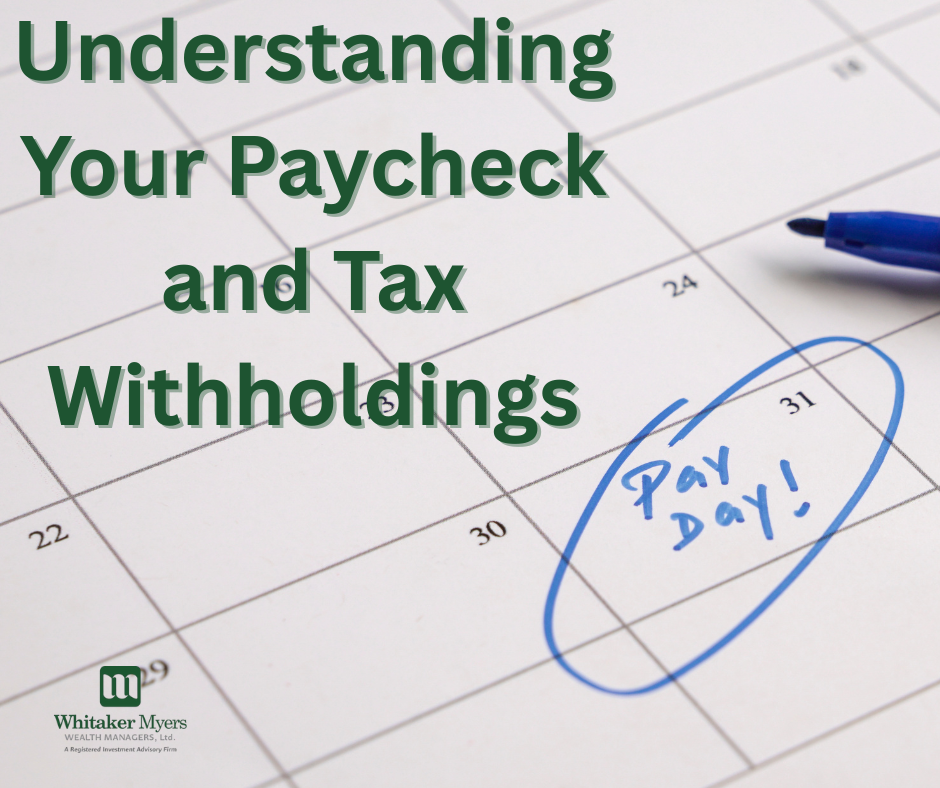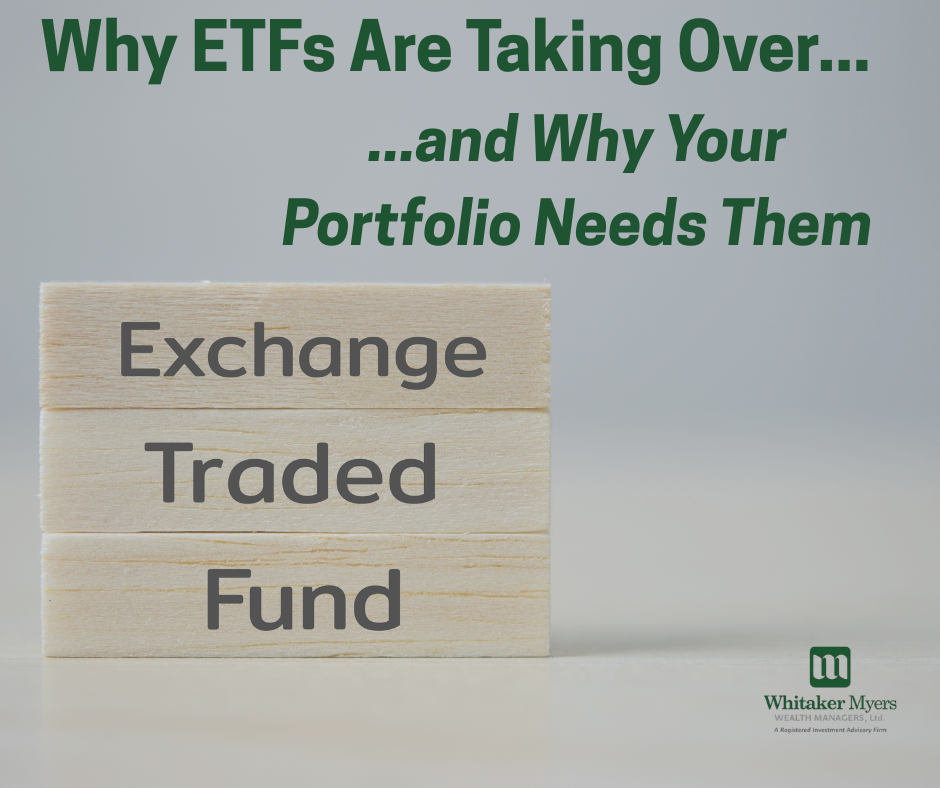Blog
John-Mark Young Earns Tax Planning Certified Professional® (TPCP®) Designation
August 23, 2025
Whitaker-Myers Wealth Managers proudly announces that President & CIO John-Mark Young, CFP®, has earned the prestigious Tax Planning Certified Professional® (TPCP®) designation from The American College of Financial Services. This advanced credential highlights his commitment to helping families maximize their financial plans through smart, values-based tax strategies—always with the heart of a teacher and a mission to serve clients with clarity and confidence.
Guiding Clients with Confidence: Logan Doup Achieves CFP® Milestone
August 20, 2025
Whitaker-Myers Wealth Managers proudly announces that Financial Advisor Logan Doup has earned his Certified Financial Planner (CFP®) designation. Joining colleagues Timothy Hilterman, CFP® and John-Mark Young, CFP®, Logan strengthens the firm’s commitment to client-first planning. The CFP® mark is the gold standard, ensuring expertise, fiduciary duty, and integrity—exactly what clients should expect from their trusted financial advisor.
Where Have All the Aggressive Growth Stocks Gone?
August 17, 2025
Small-cap investing isn’t what it used to be. With private equity fueling growth before companies ever hit the public markets, true small-cap opportunities are shrinking. At Whitaker-Myers, we define Aggressive Growth as both mid-cap and small-cap stocks—splitting exposure to capture resilient names like Invesco and Smithfield Foods while still positioning for a small-cap rebound, which research partner Tom Lee believes may be just around the corner.
College-Bound: Conversations, Checklists, and Financial Clarity
August 11, 2025
Preparing for college goes beyond dorm shopping—it’s about finalizing paperwork, having key conversations, and setting a strong financial foundation. From budgeting and insurance to emotional readiness, families can ease the transition. With the One Big Beautiful Bill Act reshaping college financing, thoughtful planning is crucial. Whitaker-Myers offers tools, guidance, and consultations to help students start college with confidence.
Stop Giving the Government an Interest-Free Loan: Understanding Your Paycheck and Tax Withholding
August 5, 2025
A tax refund isn’t a bonus—it’s proof you overpaid the IRS. By understanding your paycheck—earnings, pre-tax deductions, taxes, and net pay—you can adjust your federal withholding and keep more money in your pocket each month. For example, one couple discovered they’d loaned the government $7,000 interest-free. With the right strategy, that money could boost savings, investments, or debt payoff. Take control of your paycheck with smart planning and professional guidance.
Why ETFs Are Taking Over—and Why Your Portfolio Needs Them
August 5, 2025
ETFs offer investors diversification, liquidity, low costs, transparency, tax efficiency, and easy entry with small investments. Beyond traditional stocks and bonds, new ETF structures now provide access to asset classes like Private Credit and Cryptocurrency, once limited to wealthy investors. These features make ETFs a powerful tool for building wealth, managing risk, and customizing portfolios to meet financial goals.
Why Real Estate Might Make Sense in Your Investment Portfolio
July 29, 2025
Real estate can be a powerful tool for portfolio diversification, offering passive income, appreciation potential, and tax benefits. Unlike stocks and bonds, it provides stability during market volatility and allows greater control through active management. While risks like illiquidity and tenant challenges exist, strategic planning can help mitigate them. For many investors, real estate is a smart way to build wealth and strengthen financial security.
Mid-Year Market Check-In: Navigating Volatility Without Losing Focus
July 29, 2025
Peter Lynch once said, “If you spend more than 13 minutes analyzing forecasts, you’ve wasted 10.” His advice: ignore the noise and focus on your strategy. Mid-2025 returns show the S&P 500 up 8.1%, Nasdaq up 9.1%, Dow up 5%, Russell up 2.3%, and MSCI EAFE up 20%. Tech leaders like Nvidia and Microsoft boosted gains, while Apple and Tesla lagged. Diversification remains key. Stay the course—volatility is the cost of strong long-term returns.
Ohio Income Tax is Dropping: Here’s What You Need to Know for 2025, 2026, and Beyond
July 22, 2025
Starting in 2025, Ohio will lower its top income tax rate from 3.5% to 3.125% and shift to a flat 2.75% rate in 2026 for income over $26,050—making it the 2nd lowest state income tax in the U.S. among taxed states. Local taxes still apply and vary by city or district. These updates may impact your financial strategy. Whitaker-Myers Wealth Managers can help you plan ahead and maximize your take-home income.
Creating an Income Floor in Retirement
July 22, 2025
An income floor is the minimum reliable monthly income needed in retirement to cover essential expenses like housing, food, and healthcare. It typically includes Social Security, pensions, and dividends. Building this foundation offers stability, reduces the risk of selling investments during downturns, and supports long-term security. Pairing it with a solid budget helps retirees confidently manage cash flow and maintain their lifestyle.
Always Be Buying (ABB!): Why Consistency Beats Timing in Long-Term Investing
July 14, 2025
Consistently investing through dollar-cost averaging (DCA) helps reduce emotional stress and risk, even when markets hit all-time highs. Historical data shows buying at market peaks often leads to strong long-term returns, with nearly 30% of past highs becoming lasting floors. Rather than waiting for the perfect moment, disciplined, regular investing—Always Be Buying (ABB)—has proven to be a reliable strategy for long-term wealth building.
Understanding Trump Accounts: A New Wealth-Building Opportunity for the Next Generation
July 7, 2025
A new provision in the tax bill creates “Trump Accounts” for babies born between 2025–2028, starting with a $1,000 government deposit and allowing up to $5,000/year in contributions. Invested in a stock index fund, these accounts could grow into millions by age 50 through consistent saving and compounding. With just $50/month, families can give children a powerful financial head start. Learn how to make the most of this opportunity.
Big Beautiful Bill Act: Major Tax Law Changes That Could Impact Your Finances
July 5, 2025
The Big Beautiful Bill Act introduces major tax changes you need to know. From making lower tax brackets permanent to increasing the standard deduction and boosting the Child Tax Credit, this legislation reshapes how Americans will file and plan for years ahead. The SALT deduction cap is also temporarily lifted, offering relief for high-tax states. Explore how these updates could impact your tax bill and what steps to take to prepare. Stay informed and empowered with Whitaker-Myers.
Whitaker‑Myers Wealth Managers Celebrates Associate Financial Advisor David Gearhart Earning IRS Enrolled Agent Designation
July 5, 2025
Associate Financial Advisor David Gearhart earned his Enrolled Agent designation, strengthening Whitaker‑Myers Wealth Managers commitment to integrated tax-smart financial planning for our clients.
What Are the 2 Types of Risk – And Can an Advisor Do Anything About It?
June 30, 2025
In investing, risk isn’t binary—it’s a spectrum. Advisors help manage unsystematic risks like business or regulatory issues through diversification and planning. While systematic risks like inflation or geopolitical events can’t be controlled, advisors prepare clients to navigate them with confidence. It’s not about predicting the future—it’s about being ready for it. Ready to build resilience into your plan? Let’s talk.
The Death of the Dollar Has Been Greatly Exaggerated
June 29, 2025
The idea that the U.S. dollar is on the verge of collapse is largely hype. Despite rising debt and global tensions, no other currency offers the trust, liquidity, and stability of the dollar. The U.S. economy’s size, innovation, and rule of law keep it at the center of global finance. While headlines fuel fear, the dollar’s dominance remains strong. Long-term investors are wise to stay steady and not be swayed by doomsday predictions.
John-Mark Young Named to AdvisorHub’s “Advisors to Watch” for Third Straight Year
June 21, 2025
John-Mark Young, CFP®, was named to AdvisorHub’s “Advisors to Watch” for the third year in a row — one of only 11 RIA-based advisors in Ohio and 10 in Florida. As a fiduciary RIA, Whitaker-Myers Wealth Managers offers independent, client-first advice with no revenue sharing. “We are so thankful for our clients and their trust,” says John-Mark. “Your referrals and relationships mean the world to us — and we pray for you weekly!”
Geopolitical Conflicts: Understanding Market Implications for Investors
June 17, 2025
Rising tensions between Israel and Iran have led to market volatility and energy price swings. While geopolitical events can cause short-term disruption, history shows markets typically recover. Investors should avoid overreacting and stay focused on long-term goals. U.S. energy independence helps buffer economic risks, and diversified portfolios remain the best defense in uncertain times.
The RMD–IRMAA Trap: How to Protect Yourself from Surprise Medicare Hikes
June 16, 2025
Large IRA or 401(k) balances can trigger Medicare surcharges through IRMAA once Required Minimum Distributions (RMDs) begin at age 73. Even modest withdrawals can push income over IRMAA thresholds, raising Medicare Part B and D premiums. Strategies like Roth conversions, Qualified Charitable Distributions (QCDs), and delaying Social Security can help reduce future IRMAA exposure. Speak with a Whitaker-Myers advisor to protect your retirement income.
When should I buy a Home?
June 16, 2025
Buying a home is a major financial decision influenced by interest rates, housing prices, and your personal readiness. While market timing matters, the best time to buy is when you're financially prepared—debt-free, with a full emergency fund, and savings for a down payment. Follow Dave Ramsey’s Baby Steps and consider your long-term goals. For personalized guidance, speak with a Whitaker-Myers financial advisor today.



















